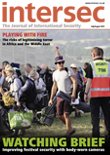Danger for the Irish border
Timothy Compston looks at the potential security ramifications of changes to the management of the Irish border post Brexit.
The high level of uncertainty that still surrounds the shape of the relationship between the UK and the EU as Brexit looms on the horizon is certainly troubling. This was underscored recently when the UK government’s international trade secretary, Liam Fox, suggested that the probability of a no deal had increased to 60-40. Alongside the economic implications of Brexit many are concerned about the ramifications for security in and around the Irish border if we end up at the harder end of the Brexit scale.
The clear and present danger, from a security perspective, is that a no deal scenario, where the UK falls back onto WTO (World Trade Organisation) rules – and moves away from free movement for EU citizens – or, for that matter, any Brexit which requires new and visible infrastructure on the 310 mile (499 kilometre) Irish border – the only land border with the remaining EU 27 – could lead to an escalation in terrorist activity. There is also the question of where the Common Travel Area (CTA) which predates the UK and Ireland joining EU will fit into the post Brexit puzzle.
When giving evidence back in May to the parliamentary European Scrutiny Committee the Northern Ireland secretary, Karen Bradley, acknowledged the reality that there are a small number of people who believe the way to achieve their aims is through violence and who would seek to destroy any physical infrastructure associated with policing the Irish border: “We have to be very careful when we look at arrangements and the suggestions that are being put forward about how we would police it, how we would manage it should infrastructure be needed at some place in order to maintain the customs arrangement.”
There have, of course, been positive noises from the parties involved in Brexit negotiations about their desire to minimise disruption at the border, although only time will tell if they can square the circle on thorny issues like freedom of movement and customs arrangements. Referring to the importance of maintaining the Common Travel Area in her Mansion House speech on Brexit at the beginning of the year, the British Prime Minister, Theresa May, stressed that: “We will work to deliver a practical solution that allows the maintenance of the Common Travel Area with the Republic [of Ireland], while protecting the United Kingdom’s immigration system.” She went on to say that: “Nobody wants a return to the borders of the past.”
Fast-forwarding to July and the Prime Minister travelled to Belfast to speak in the wake of the Chequers agreement and subsequent UK Government white paper proposal which seeks to align the UK with the EU on traded goods but not services. She reiterated the need – twenty years on – to protect the peace process and uphold the binding commitments in the Belfast (Good Friday) Agreement between the two governments and NI political parties: “Not to seek a solution would be to resume our career as an independent sovereign trading nation by betraying our nearest neighbour.” Her comments were in the face of Eurosceptics in her party saying that the UK should simply declare that it would not impose any checks on its side of the border and simply leave it up to the EU and the Irish Government to control things.
For both the EU, in the shape of the chief negotiator, Michel Barnier, and the Irish government the imperative to prevent a hard border is certainly high on the agenda and they continue to reiterate the importance of having a backstop on the Irish border question should no agreement be reached which could, potentially, mean in the absence of another solution for the border that Northern Ireland would, to all intents and purposes, remain in the EU customs union. This is something which remains problematic for the British who do not want the result of such a backstop to effectively create a border down the Irish Sea between Northern Ireland and the rest of the UK, a scenario which Theresa May has been clear that no British Prime Minister could countenance. Of course, the hope is that the UK Government’s latest moves with regards to the trading of goods – with a ‘common rule book’ to avoid friction at the Irish border – will negate the need for any backstop in the first place.
Some may argue that the danger of a ramp-up in violence, if there is a change to the status quo post Brexit is being overplayed. As a backdrop to current developments it is true that, from a security perspective, the situation in Northern Ireland is a far cry from the height of the Troubles. The latest ‘Police Recorded Security Situation Statistics’ report from the PSNI (Police Service of Northern Ireland) covering April 2017 – March 2018 offers some comfort on the level of violence as there were only two murders related to the security situation in the past year. To put this into some sort of historical perspective the murder rate has reduced 39-fold in the 28 years covered by the report, in a time that the Good Friday (Belfast) and Stormont House agreements came into play, devolution materialised – with a NI Assembly up and running – and power-sharing by sworn enemies like Ian Paisley and Martin McGuinness.
Paralleling a downward trend in terrorist incidents there has been a major draw down of security force numbers and the dismantling of much of the counter terrorism infrastructure associated with the ‘Troubles’ – watchtowers, checkpoints, armoured vehicles, military helicopters – and the opening of unmarked roads and lanes across the border which had been blocked off. Today the reality of driving from North to South or South to North is pretty similar to travelling between England and Scotland or even between different counties within those countries. People may live on one side of the border and work or even go to school on the other.
This is not to say that there have not been bumps along the road in recent years. The fact that the two main political parties in Northern Ireland are now unable to come to an agreement to go back into government together, since Sinn Féin walked out – and then, more recently, accusations that a deal was in the offing only for the DUP to get cold feet – has created a political vacuum as the Brexit process moves forward. Sectarianism still exists under the surface and on the terrorism front there are a small number of extremists – and their supporters – who are intent on creating instability with dissident republicans and trouble in Londonderry/Derry over the summer being a case in point. These terrorist groupings may seek to use Brexit as an excuse to further their own agenda by directing violence at any new infrastructure – and those manning and protecting it – that appears to implement the working of future trading arrangements and controls the movement of people across the border.
Given this backdrop, as Brexit looms it is going to be vital that community representatives and politicians temper their language so as not add fuel to the flames being stoked by other parties who are simply not interested in engaging in the political process. At the end of last year Doug Beattie, the justice spokesperson for the Ulster Unionist party, criticised Chris Hazzard the South Down MP of Sinn Féin (SF) for, in his words, “openly talking about a return to violence and civil disorder.” The comments Beattie was referring to came when Hazzard was speaking at a Westminster press conference about the reaction on the ground to the possibility of border customs posts or other hardware: “An awful lot of the focus has been on maybe dissident republican organisations and threats, but it is wider than that – it goes right down to a feeling of civil disobedience. When you talk to normal people in civic society they are very, very angry and frustrated at even the thought of a customs post going up.”
Another potentially destabilising consequence of a harder Brexit is, of course, a renewed push by nationalists and republicans for a border poll. Interestingly, at the end of July it seemed that Sinn Féin’s new president, Mary Lou McDonald, was inclined to put this onto the backburner given the disruption around Brexit and was quoted in the Irish News as saying: “It is not my preferred option or our preferred option that we deal with the issue of Irish unity in a climate that is unsteady or unstable or chaotic, in other words in the context of a crash Brexit or a very hard Brexit.” However, this was not well received by many SF supporters and she, subsequently, rowed back on holding off on a border poll, so a poll at the earliest opportunity is very much back on the party’s wish list. An interesting aside to all of this is, of course, the rush by many in Northern Ireland who would class themselves as Unionist and British – especially from the middle classes – to apply for Irish passports. Something they can do thanks to the Good Friday Agreement as people born in NI can choose to be British citizens, Irish citizens or both. Consequently, post Brexit a point may be reached where a majority in Northern Ireland are EU citizens living outside the EU.
Given the uncertainty in the air surrounding Brexit we have already seen, as a precautionary measure, the Police Service of Northern Ireland (PSNI) take steps to put on hold the sale of three police stations that it was planning to dispose of including at Warrenpoint. The chief constable of the PSNI, George Hamilton, when giving evidence in the House of Commons to the Northern Ireland Affairs committee on June 27, underscored the challenges ahead and his frustration regarding who to turn to so decisions could be made on additional officers: “Trying to find the appropriate authority within the system who is taking responsibility for co-ordinating the response to Brexit as it relates to the border between the EU and the UK or the Republic of Ireland and Northern Ireland is challenging.”
Regarding the police stations, he felt that it makes sense to retain them for now even though they currently have no operational role: “With so many unanswered questions, with these pieces of real estate strategically placed —not necessarily right on the border, but within proximity — we do not know what the requirements are going to be of immigration, of HMRC, of ourselves, of any other number of other agencies.” He did acknowledge that if they had some post-Brexit role that they might be in the firing line: “We agree, Chairman, that if they were to be used in a post-Brexit era for security or immigration purposes or other broader policing and statutory functions that they may well become the target of attention from violent dissident Republicans, so we do not have some agenda to maintain these.”
In terms of the ‘stocktake paper’ which the PSNI has just produced around policing and Brexit, the chief constable told the committee that three elements were at the forefront, namely: “Tighter immigration control and maintaining the CTA [Common Travel Area], the fact that any variances will be exploited by people wanting to do us harm, and the fact that the UK and Brussels and Dublin do not want to have any physical infrastructure at the border – what are the implications of that?”
Looking ahead, it has to be hoped that whatever shape Brexit finally materialises into calm heads will prevail and that it does not cause issues for the security forces in Northern Ireland, or the wider peace process, and, crucially, if there is an upsurge in violence the right level of resources are in place to deal with this eventuality. It is hard to envisage a return to the scale of bombings and shootings that were all too common in the 60s, 70s, and 80s and early 90s, Northern Ireland has changed and so too has the Republic of Ireland, but a lower level terrorist incidents and public disorder cannot be discounted.
Timothy Compston is a journalist and PR professional who specialises in security issues. He studied International Relations and Strategic Studies at Lancaster University, is PR Director at Compston PR and a previous Chairman of both the National Committee and CCTV PR Committee of the British Security Industry Association.









